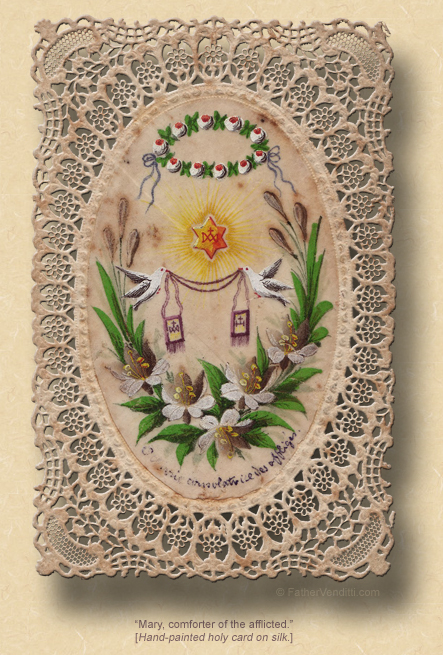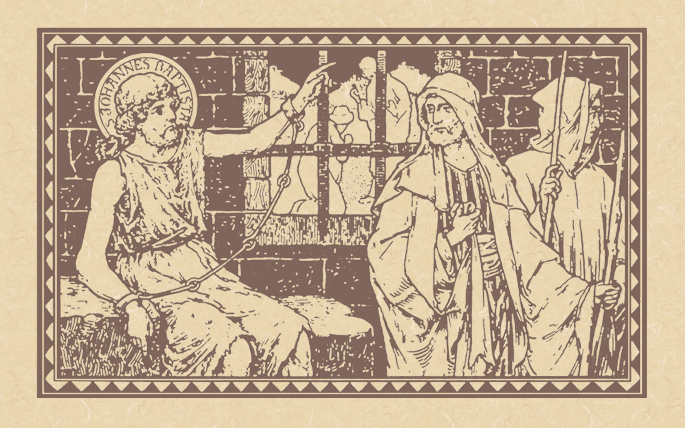Two Peas in a Pod.
The Seventeenth Saturday of Ordinary Time; the Memorial of Saint Peter Chrysologus, Bishop & Doctor of the Church;* or, the Memorial of the Blessed Virgin Mary on Saturday.
Lessons from the secondary feria, according to the ordinary form of the Roman Rite:
• Jeremiah 26: 11-16, 24.
• Psalm 69: 15-16, 30-31, 33-34.
• Matthew 14: 1-12.
|
…or, from the proper for the saint:
• Ephesians 3: 8-12.
• Psalm 119: 9-14.
• Luke 6: 43-45.
…or, any lessons from the common of Pastors for a Bishop, or the common of Doctors of the Church, or the common of the Blessed Virgin Mary.
|
The Tenth Saturday after Pentecost; and, the Commemoration of Saints Abdon & Sennen, Martyrs.**
Lessons from the dominica,*** according to the extraordinary form of the Roman Rite:
• I Corinthians 12: 2-11.
• Psalm 16: 8, 2.
• Luke 18: 9-14.
|
If a Mass for the commemoration is taken, first & second lessons from the proper, third from the common "Intret…" of Many Martyrs:
• II Corinthians 6: 4-10.
• [Gradual] Exodus 15: 11.
• Luke 21: 9-19.
|
The Tenth Saturday after Pentecost; and, the Feast of the Holy Apostles Silas, Silvanus & their Companions.†
Lessons from the pentecostarion, according to the Ruthenian recension of the Byzantine Rite:
• I Corinthians 1: 3-9.
• Matthew 19: 3-12.
FatherVenditti.com
|
10:18 AM 7/30/2016 —
“It was the Lord who sent me to prophesy against this house and city all that you have heard. Now, therefore, reform your ways and your deeds; listen to the voice of the Lord your God, so that the Lord will repent of the evil with which he threatens you” (Jer. 26: 12-13 RM3).
 The Holy Prophet Jeremiah in today's first lesson, when he was threatened with a death sentence for telling the truth. Thankfully, for the Prophet, his words stabbed at the heart of the priests, prophets and princes who heard him: they spared his life. John the Baptist, in our Gospel lesson, didn't fair so well: his words stabbed to the heart as well, but Herod reacted in fear and anger, not in repentance, and had John's head cut off. Jeremiah and John: two peas in a pod, both sent by God to call His people back to the truth, both doing it in exactly the same way, and both getting very different results. Of course, we know why God, in His Providence, allowed John to die, as it was part of the whole plan of salvation that God devised for us in Christ; Jeremiah's prophesy was only a prelude. But it does teach us some valuable lessons about the whole principle of reparation, which is so much of what we are about here at the Shrine, particularly as it pertains to our devotion of the Five First Saturdays. The Holy Prophet Jeremiah in today's first lesson, when he was threatened with a death sentence for telling the truth. Thankfully, for the Prophet, his words stabbed at the heart of the priests, prophets and princes who heard him: they spared his life. John the Baptist, in our Gospel lesson, didn't fair so well: his words stabbed to the heart as well, but Herod reacted in fear and anger, not in repentance, and had John's head cut off. Jeremiah and John: two peas in a pod, both sent by God to call His people back to the truth, both doing it in exactly the same way, and both getting very different results. Of course, we know why God, in His Providence, allowed John to die, as it was part of the whole plan of salvation that God devised for us in Christ; Jeremiah's prophesy was only a prelude. But it does teach us some valuable lessons about the whole principle of reparation, which is so much of what we are about here at the Shrine, particularly as it pertains to our devotion of the Five First Saturdays.
At the risk of telling you what you already know, the requirements for the Five First Saturdays are simplicity itself: Confession, Holy Communion, five decades of the Holy Rosary and fifteen minutes of meditation on the Mysteries thereof. What may not be so simple is the requirement that these very simple things be done in a spirit of reparation. On the surface, we could interpret that command of the Mother of God in a very matter-of-fact manner, and just say that we simply make an intention to offer up these four tasks for the offenses listed by our Lady: (1) attacks upon Mary's Immaculate Conception; (2) attacks against her Perpetual Virginity; (3) attacks upon her Divine Maternity and the refusal to accept her as the Mother of all mankind; (4) for those who try to publicly implant in children's hearts indifference, contempt and even hatred for their Immaculate Mother; and (5) for those who insult her directly in her sacred images. During the special services we have on the First Saturdays of each month during the summer we look at these blasphemies in detail.
But, given the example to us in Holy Mass today by the two great prophets, Jeremiah and John, we need to tackle this Spirit of Reparation itself, because it can be misinterpreted; and, it is most frequently misinterpreted by those who allow themselves to do it in a spirit of contentious anger. Let me try to explain what I mean.
One of the virtues—if you want to call it that—presented to us by our Lord in the Holy Gospels and by our Lady at Fatima is a hatred for sin and evil; but, we are hampered by the fact that English is not nearly as expressive a language as Greek and Hebrew; and, for us, hatred is a loaded word. The word for hate in Greek is μισήσει, which literally means to reject on an intellectual level; in other words, when I express μισήσει for your argument, I'm simply saying that I have heard what you have to say, and have concluded that it's wrong, and therefore reject it. There is no connotation of an emotional response in the word; but, when we translate the Gospels from Greek into English, we need to find an English word that means the same thing—or something close to it—so, we choose the word “hate,” which is an emotionally charged word. Even if we were to try and tone it down by choosing the word “rejection,” that, too, implies an emotional response for us. And I have often feared that many devotees of Fatima, when entering into their First Saturday duties, practice what they believe is a spirit of reparation with a kind of curmudgeonly attitude, as if they're saying, “Lord, single out those who have committed these five offenses against Your Mother, and make sure they get their comeuppance.” That does not even resemble a true spirit of reparation.
Now, the interior life is like every other aspect of life in one respect, in that we bring to it all the emotional baggage that results from how we've been raised and what we've had to endure in our lives; and, I've known—and I'm sure you've known as well—people who are just naturally bitter and angry people. Their patron saint is the Prophet Jonah. If you've never read the Book of the Prophet Jonah, it's very short, and right at the very beginning Jonah is presented to us as a very bitter and angry man without any explanation why. He just is that way, and everything that happens to him is because of his penchant to always assume the worst about everyone; and, when he finally agrees to go and preach to the city of Nineveh, he secretly harbors a desire that they don't repent, because he wants to see them destroyed. They do repent, and the last scene in the book is Jonah sitting under a tree hating God because God didn't destroy them. God reaches out to Jonah and wants to talk to him about it, but Jonah refuses to listen, and that's how the book ends. And we never do find out why Jonah is that way.
We've all known people like this: they're angry at the world, and take out their anger on everyone they meet, and we will probably never know why. And when such people take up the First Saturday devotion, their idea of a spirit of reparation is to beg our Lord to punish those who have offended our Lady. But that's not reparation.
It's the Prophet Jeremiah, in our first lesson today, who gives us the true spirit of reparation: “…reform your ways and your deeds; listen to the voice of the Lord your God, so that the Lord will repent of the evil with which he threatens you” (26: 13 RM3). Reparation has to be in conjunction with the virtue of charity. We make reparation not because we hate the sinner, but because we love the sinner and we want the sinner to be spared. Ideally, we want the sinner to repent; but, even if he doesn't repent, we still want him to be spared. Why? Because there isn't one of us who is not a sinner, and the mercy we wish for others is the measure of the mercy we shall receive ourselves.
So, even though today is not a First Saturday, during this Mass let us pray for reparation, but making sure that it's true reparation we seek, asking our Lord to visit his mercy on all sinners, so that they may be saved.

* The Bishop of Ravenna, Saint Peter (c. 380-450), known as "Chrysologus," a name which means "golden-worded," was famous for his charity, his writings and his preaching.
** Abdon and Sennen, natives of Persia, were arrested and brought to Rome, suffering martyrdom under Decius in 254.
*** On ferias outside of privledged seasons, the lessons are taken from the preceding Sunday.
† Some Scripture scholars maintain that Silas and Silvanus were the same person. He (or they) accompany the Blessed Apostle Paul on his first and second missionary journeys as recorded in Acts 18, and Silas is mentioned as preaching with Paul in II Corinthians. He is also regarded as the co-author, along with Timothy, of Paul's Epistles to the Corinthians; and, in his first epistle, Peter refers to him as "a faithful brother."
|

